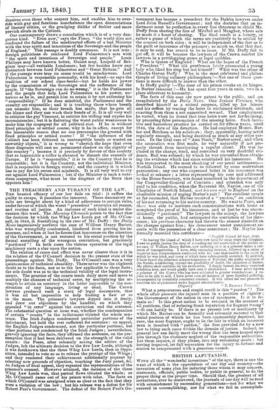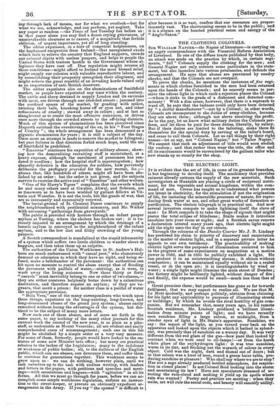BRITISH LAPUTANISM.
WITH all the " wonderful inventions" of the age, there is one the want of which is the opprobrium of our day and country—the invention of some plan for inducing those whom it may concern, statesmen, officials, public bodies, or public in general, to do the proper thing at the proper time. Should that, the greatest of all inventions, ever be discovered, the journals of our day will be read with astonishment by succeeding generations—not for what we succeed in accomplishing, nor for what we fail in accomplish- ing through lack of means, nor for what we overlook—but for what we see, acknowledge, and can perform, yet neglect. Take any paper at random —the Times of last Tuesday lies before us : in that paper alone you may find a dozen crying grievances, of unmistakeable clearness as to causes, of a magnitude that forbids oblivion, of urgent importance, yet all of long standing. The editor expatiates, in a tone of congenial helplessness, on the haphazard emigration from Ireland—that unregulated exode which fails to relieve the country that England supports, crowds our colonial depots with useless paupers, and helps to people the United States with traitors hostile to the Government whose al- legiance they have cast off. Due regulation might reverse all those conditions—might afford to Ireland the most blessed relief, might supply our colonies with valuable reproductive labour, and by consolidating their prosperity strengthen their allegiance, and might relieve the great republic of an invading horde valued only as an importation of anti-British deserters. The editor expatiates also on the abominations of Smithfield market, as people have expatiated any time within the century. The cattle and sheep destined to supply London and its environs with meat, are driven through our crowded streets ; jammed into the confined spaces of the market, by goading with spikes, twisting their tails, knocking horns off OT eyes out, and other refinements of cruelty ; stowed away in cellars ; and at last so slaughtered as to create the most offensive nuisances, or driven once more through the crowded streets to the off-lying districts. Much of this system of abominations has been perceived since Hogarth satirized the overdriving of the ox, in his " Four Stages of Cruelty " ; the whole arrangement has been denounced as a gigantic abomination for years ; it is still a subject of the day. Once more an attempt is made to remove the market to Islington ; but past failures in that direction forbid much hope, until the use of Smithfield be prohibited. "Emeritus" continues his exposition of military abuses; show- ing how the demoralizing recruiting staff is maintained, at a heavy expense, although the enrolment of pensioners has ren- dered it needless ; how the hospital staff is supererogation ; how absurdly defective is the education for soldiers, how perversely deliberate the profligacy provided for the new recruit, &c.;— abuses that, like hundreds of others, might all have been abo- lished by an order : but the order is not given, and the subjects survive to exercise the active zeal of "Emeritus" and other writers.
"One of Sir Harry's Tigers" complains that the swords which he and many others used at Gwalior, Aliwal, and Sobraon, are so timeworn as to have been wielded by gallant fellows at Vit- toria and Waterloo. It is not the tools, but the gauds of war, that are so incessantly and expensively renewed.
The burial-ground of St. Clement Danes continues to supply the neighbourhood with pestilential miasmata, and Mr. Walker with unceasing "gatherings from graveyards." The public is provided with horrors through an infant pauper asylum at Tooting, where the cholera has broken out : it is va- riously imputed to an arrangement by which the drainage of a lunatic asylum is conveyed to the neighbourhood of the infant asylum, and to the low diet and filthy crowding of the young paupers.
A Scotch correspondent is scandalized at the stupid inhumanity of a system which suffers two litttle children to wander about as beggars, and then takes them up as culprits.
The authorities of the Union Workhouse in St. Andrew's Hol- born are much embarrassed with "casual poor," who clamorously demand an admission to which they have no right, and being re- fused, make a bedchamber of the pavement : the authorities can hit upon no measure to control the abuse except that of flooding the pavement with pailfuls of water,—striving, as it were, to wash away the living nuisance. Now those thirty or forty " casuals" must inevitably belong to one or other of two classes,— they are either creatures helplessly borne down by a calamitous destitution, and therefore require an asylum ; or they are va- grants, that merit a prison: for neither class is a pailful of water the appropriate provision.
" Bills Vera," one of the many correspondents who touch upon these things, expatiates on the long-existing, long-known, and long-denounced abuses of the grand jury system ; abuses easily remedied without losing the advantages of the system, but des- tined to be the subject of many more letters. Now each one of these abuses, and of more set forth in the same paper, to say nothing of the many other journals for this current week the second of the new year, is as plain as a pike- staff, as undeniable as Mount Vesuvius; all are evident and easily comprehended cases of mismanagement ; each one in this list might be abolished by a simple order or a very easy measure. For some of them, formerly, people would have looked to the en- trance of some new Minister into office ; but many are practical rebukes to the lathes of the Legislature; many to the indolence or weakness of public bodies ; all, to the dullness of the English public, which can see abuses, can denounce them, and suffer them to continue for generations together. This weakness seems to grow upon us : we can do nothing, however plain, until we lash ourselves up to the task with endless writing, with leaders and letters in the papers, with petitions and speeches and meet- ings—with associations and leagues—with " agitation " in all its forms. All this we must go through for years, before we can ac- complish some simple workhouse regulation, enforce an instruc- tion to the street-keeper, or procure an obviously expedient ar- rangement in the Army. If you say " the system " is difficult to alter because it is so vast, confess that our resources are propor- tionately vast. The shortcoming seems to be in the public ; and it is a stigma on the boasted practical sense and energy of the " Anglo-Saxon."



























 Previous page
Previous page